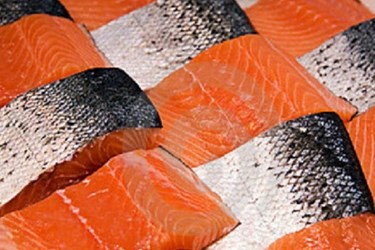Safeway And Kroger Say "No" To Genetically Modified Salmon
By Laurel Maloy, contributing writer, Food Online

Retailers, consumers, and advocacy groups are anxiously waiting for the FDA’s decision on genetically modified salmon. Will it be approved for human consumption without the benefit of human trials?
Just the hint that the FDA will approve AquAdvantage Genetically Modified (GM) salmon for public consumption is making waves, though it has not officially done so at time of writing. Safeway and Kroger, the two largest U.S. retail grocery companies, have just announced the decision to not sell GM salmon, joining retailers Target, Whole Foods, and Trader Joe’s. A challenge has been issued to Costco, Walmart, Albertsons, and other large retailers to follow suit, by a consumer coalition group, Friends of the Earth. This announcement brings the total number of retailers to more than 60, with more than 9,000 grocery stores nationwide vowing to ban the selling of GM salmon.
"This is good news, as FDA's human and environmental assessments of the safety of this genetically engineered fish are both seriously flawed,” says Michael Hansen, PhD, senior scientist at Consumers Union, the public policy arm of Consumer Reports. There have never been, and there are currently no human clinical trials on the effects of GM foods. Animal studies, though, have been ongoing — the Institute for Responsible Technology (IRT) reports the American Academy of Environmental Medicine’s (AAEM) conclusion that “Several animal studies indicate serious health risks associated with GM food.”
AquaBounty, the parent company of AquAdvantage Salmon (AAS) is self-described as a “a bio-technology company dedicated to the improvement of productivity in aquaculture.” The company explains that this sustainable alternative to farmed salmon has, “A gene from the Chinook salmon, which provides the fish with the potential to grow to market size in half the time of conventional salmon.” They further state, “In all other respects, AAS are identical to other Atlantic salmon.”
Opponents argue that due to the lack of human testing, there is not enough information to ensure that GM salmon is safe for human consumption in the long term. Advocacy groups such as Greenpeace, Organic Consumers Association (OCA) and the Union of Concerned Scientists (UCS) have all expressed concerns. They question the objectivity of the regulators; in fact, they question the FDA regulatory process itself. There is also unease about the control of the food supply in companies that make and sell GMO products.
Proponents argue that genetic modification of DNA is basically the same process that would happen through evolution in the natural order of things, albeit much quicker. They point out that improvements can be made that would not normally be possible, due to the limited genes present within any particular species. To put it more succinctly, DNA from one species can be used to improve another.
This argument has been going on for a number of years now. UCS first expressed its concern about the processes the FDA will use for regulating GM salmon in autumn of 2010. The truth is that consumers may have been eating genetically modified foods as early as 1990, without ever being made aware of it. GM food safety was first broached at a meeting with the World Health Organization (WHO), the Food and Agriculture Organization (FAO) and representatives of the GM biotech industry.
The truth is the FDA is far behind the rest of the world in regulating GM products. Around the world, 64 countries require labeling ensuring consumer awareness of the presence of genetically modified ingredients. The U.S. has no such regulation in place. The FDA’s Generally Recognized as Safe (GRAS) designation of GMO products, such as soy bean oil — one of the first genetically modified and widely-used products — means a whole host of GM products are exempt from labeling requirements.
Producers are concerned that consumers will not buy products having “made with GMO” labels. As the list of retailers refusing to sell GM products grows, it appears those concerns are well-founded. Consumers feel they have a right to know what they are eating, as demonstrated in this ABC News Poll. Though it’s rare to find near-unanimity in a public opinion poll, 93 percent of those questioned voted on the side of truth in labeling. This is clearly indicative of the consumer’s belief the FDA should require labeling on genetically modified foods. It is also an indication of the consumer’s concern when it comes to eating a lab-modified food that has not been sufficiently tested. The question remains, “Is the FDA listening?”
Want to publish your opinion?
Contact us to become part of our Editorial Community.
